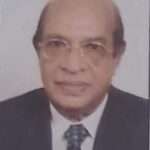
Mr. AM Ahsanullah was former Secretary, Ministry of Posts and Telecommunications.
Mr. Ahsanullah was a serious and brilliant student from childhood, a serious and committed person. He got his BA with Honors and MA in English from Dhaka University in 1947, He passed the CSS examination in 1949 and joined the Postal Service. Before joining this job, he was a teacher of English in Sylhet MC College. He taught with immense efficiency and foresight in his work
Just before the Liberation war broke out, a senior official of the Pakistan Postal department Mr. A.M. Ahsanullah, was assigned as Deputy Director General (Staff and Establishment) and was on a visit at Dacca. He could not go back to his duty at Karachi, Pakistan. But very regrettably the Pakistan rulers arrested him on 2 June 1971 and kept him in prison for a long time and brutally tortured him.
After the Liberation War, Mr. Ahsanullah was released from jail by the Liberation Forces. As there was no other senior officer to take charge of the postal department of this new nation, Mr. Ahsanullah assumed the charge of the Director General and started his office on 19 December.
While talking to Siddique Mahmudur Rahman, pioneer Researcher on Bangladesh Postal History, in a personal dialogue, Mr. A.M. Ahsanullah, first Director General of Bangladesh Post Office after Liberation of Bangladesh said:
I was then stationed at Karachi, in the rank of Deputy Director General (Staff and Establishment). By the end of February I came to Dhaka on tour to clear up a crisis related to employees union. But before the work is finished that tremendous movement started. It was impossible to return, even I did not wanted to return either. Because after observing the style and tempo I was confident that this movement must turn into liberation struggle. At the onset I started to prepare how to make the postal service uninterrupted. The first problem I thought to come first is the supply of postage stamps. Because this is another item we have to depend on the West Pakistan, the Security Printing Press and the Mint were situated in West Pakistan. Therefore I sent a telegram to Karachi to send us at least six months supply. The first consignment reached during the Liberation war.
He also said,
The external manifestations of the independent entity of an independent country, easily and effectively revealed among the people are its own postage stamps and its coins and currency. Mujibnagar Government virtually issued their postage stamps to get international recognition of its independent status. These eight postage stamps of different denomination played an important role in history of Liberation War and this set of postage stamp will remain illustrious in the world of philately.
These eight stamps presented in the reception, is now preserved on a tray wrapped in golden cloth, in the Mukti Juddho Smrity Jadughar (Liberation War Memorial Museum), Agargaon, Dhaka.
He started the journey of the Postal Department with the responsibility of the postal department.
With his initiative Bangladesh Philatelic Society was formed. He was very helpful towards the philatelists.
He retired in 1982 from the post of Secretary of the Ministry of Posts and Telecommunications.


